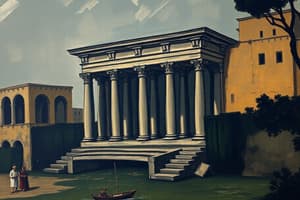Podcast
Questions and Answers
Who were the legendary founders of Rome?
Who were the legendary founders of Rome?
- Julius Caesar and Augustus Caesar
- Romulus and Remus (correct)
- Aeneas and Tarquinius Superbus
- Senators and Consuls
What marked the end of the Roman Kingdom?
What marked the end of the Roman Kingdom?
- The establishment of the Roman Empire
- The beginning of the Punic Wars
- The overthrow of Tarquinius Superbus (correct)
- The assassination of Julius Caesar
What significant change occurred during the Roman Republic?
What significant change occurred during the Roman Republic?
- Shift from monarchy to elected officials (correct)
- Rise of Christianity as the official religion
- Consolidation of power by dictators
- End of military conquests
Which factor contributed to the decline of the Roman Empire?
Which factor contributed to the decline of the Roman Empire?
How did Christianity evolve within the Roman Empire?
How did Christianity evolve within the Roman Empire?
What role did the Byzantine Empire play in history?
What role did the Byzantine Empire play in history?
What was the Spanish Inquisition primarily aimed at?
What was the Spanish Inquisition primarily aimed at?
Which event is associated with the Age of Exploration?
Which event is associated with the Age of Exploration?
Which event marked the transition from the Roman Kingdom to the Roman Republic?
Which event marked the transition from the Roman Kingdom to the Roman Republic?
What was a direct consequence of the Jewish-Roman Wars?
What was a direct consequence of the Jewish-Roman Wars?
What characterized the Roman Empire during its peak?
What characterized the Roman Empire during its peak?
Which significant factor contributed to the establishment of Christianity as the official religion of the Roman Empire?
Which significant factor contributed to the establishment of Christianity as the official religion of the Roman Empire?
What was one major consequence of the Crusades?
What was one major consequence of the Crusades?
Which development occurred as a result of the Protestant Reformation?
Which development occurred as a result of the Protestant Reformation?
What was a primary aim of the Spanish Inquisition?
What was a primary aim of the Spanish Inquisition?
Which entity emerged after the division of the Roman Empire?
Which entity emerged after the division of the Roman Empire?
Flashcards
Roman Kingdom
Roman Kingdom
The first period of Roman history, ruled by kings, ending with the overthrow of Tarquinius Superbus.
Roman Republic
Roman Republic
Period after the Roman Kingdom marked by elected officials like consuls and senators, expansion (Punic Wars).
Roman Empire
Roman Empire
Vast empire, encompassing much of Europe, North Africa, and Middle East, transitioned from Republic.
Julius Caesar
Julius Caesar
Signup and view all the flashcards
Augustus Caesar
Augustus Caesar
Signup and view all the flashcards
Christianity Origin
Christianity Origin
Signup and view all the flashcards
Judaism in Rome
Judaism in Rome
Signup and view all the flashcards
Byzantine Empire
Byzantine Empire
Signup and view all the flashcards
Punic Wars
Punic Wars
Signup and view all the flashcards
Consuls & Senators
Consuls & Senators
Signup and view all the flashcards
What brought down the Roman Kingdom?
What brought down the Roman Kingdom?
Signup and view all the flashcards
Augustus Caesar's Legacy
Augustus Caesar's Legacy
Signup and view all the flashcards
What led to the decline of the Roman Empire?
What led to the decline of the Roman Empire?
Signup and view all the flashcards
Rabbinic Judaism
Rabbinic Judaism
Signup and view all the flashcards
Spread of Islam
Spread of Islam
Signup and view all the flashcards
What is the 'La Reconquista'?
What is the 'La Reconquista'?
Signup and view all the flashcards
Study Notes
Roman Civilization: Origins and Early Periods
- Romulus and Remus, legendary founders, suckled by a she-wolf.
- Aeneas, Trojan hero, ancestor of the Romans.
- Roman Kingdom, ruled by kings (beginning with Romulus).
- Monarchy ended with Tarquinius Superbus' overthrow.
Roman Republic
- Established after the monarchy's fall.
- Ruled by elected officials (consuls and senators).
- Expanded significantly, notably during the Punic Wars against Carthage.
Roman Empire: Rise of the Empire
- Julius Caesar's rise and assassination.
- Augustus Caesar solidified power, establishing the Roman Empire.
Roman Empire: Extent and Division
- Vast empire encompassing Europe, North Africa, and the Middle East.
- Divided into Western and Eastern Roman Empires (Byzantine).
- Decline and fall due to economic issues, political instability, and barbarian invasions.
Religion and Culture in the Roman Empire
Judaism
- Thriving Jewish communities throughout the empire.
- Jewish-Roman Wars resulted in the Second Temple's destruction in Jerusalem.
- Rabbinic Judaism became influential.
Christianity
- Originated as a Jewish sect, later a distinct religion.
- Faced persecution, eventually gaining legal status and becoming the official religion.
- Spread throughout the empire and beyond.
Islam
- Founded by the Prophet Muhammad.
- Rapid expansion across the Middle East, North Africa, and parts of Europe.
- Shared beliefs with Judaism and Christianity, including monotheism.
The Middle Ages and Beyond
Byzantine Empire
- Continuation of the Eastern Roman Empire.
- Preserved Greek culture and learning.
- Played a role in the Crusades.
Crusades
- Series of religious wars between Christians and Muslims.
- Affected European culture, trade, and exploration.
La Reconquista
- Christian reconquest of the Iberian Peninsula from Muslim rule.
Spanish Inquisition
- Period of religious persecution against heresy.
Age of Exploration
- Christopher Columbus's voyages to the Americas.
- European colonization of the Americas.
Protestant Reformation
- Religious movement challenging the Catholic Church's authority.
- Led to Protestant denominations (Lutheranism, Calvinism).
- Sparked religious wars and European political turmoil.
Studying That Suits You
Use AI to generate personalized quizzes and flashcards to suit your learning preferences.




